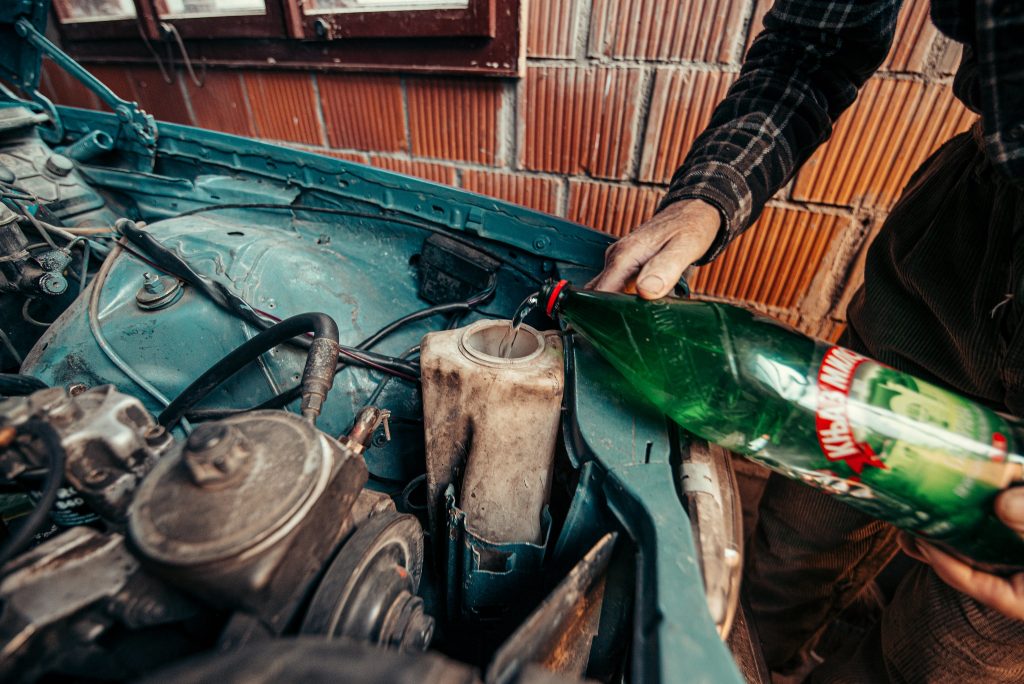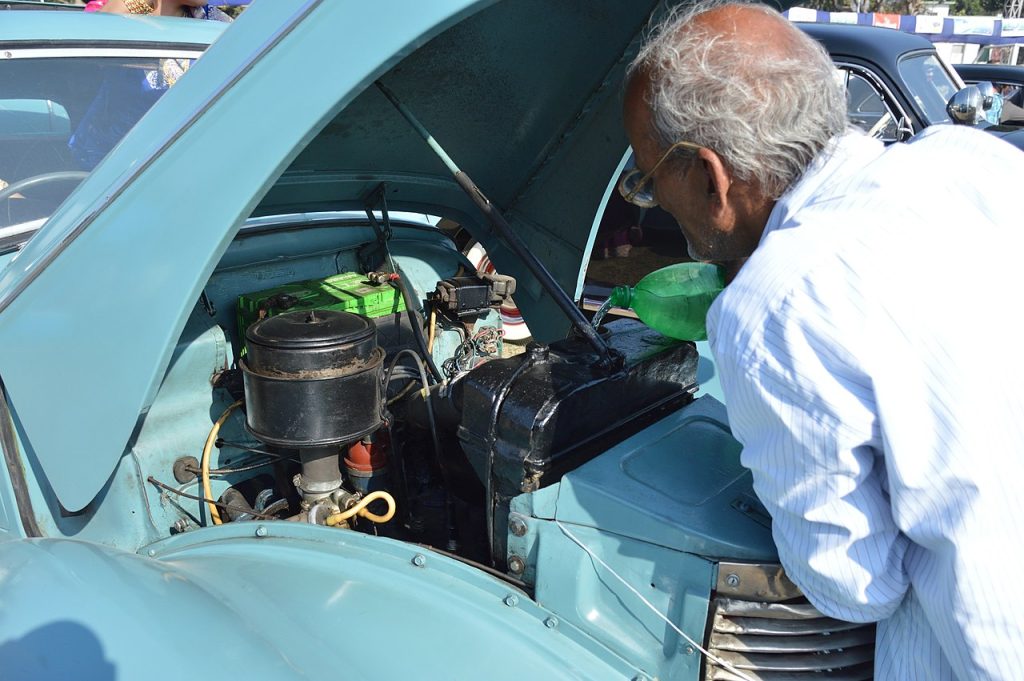One of the most important aspects of keeping your car running well is making sure that the engine is properly cooled.
This is why it’s important to use the right type of coolant in your car. But what if you run out of coolant or don’t have any on hand? Can you use water instead?
In this blog post, we will explore whether or not it’s safe to use water as a substitute for coolant in your car.
Key Takeaway
- Technically, you could use water instead of coolant. But, when the engine reaches its optimum temperature, the water will start to boil and evaporate.
- You shouldn’t use water instead of coolant in the winter because the water will freeze and expand and damage the cooling system.
- Water instead of coolant also will cause rusting in the cooling system parts such as the radiator and heater core.
Can I Use Water Instead Of Coolant?

Water should only be used temporarily as a coolant because its boiling point of 212 degrees Fahrenheit is higher than the engine’s operating temperature of 220 deg F (15.5 deg C).
Boiling water won’t do any good for cooling the engine; rather, it will add even more heat and cause it to overheat.
Furthermore, the freezing point for water is 32 degrees Fahrenheit; if temperatures outside exceed this mark, the liquid may freeze and expand, damaging its cooling system in the process.
Coolant‘s main job is to remove heat from an engine by circulating through it and absorbing heat. After passing through the radiator, coolant is cooled by air moving over it before returning it back into circulation in the engine for further absorption of energy.
Furthermore, coolant contains rust inhibitors and other chemicals that protect against corrosion in case you run low on coolant – can water be used instead?
Conversely, coolant has superior heat and cold resistance. A 50/50 mixture of coolant has a freezing point of -35 degrees Fahrenheit while a 70/30 mixture can freeze to -84 degrees Fahrenheit. Furthermore, its boiling point is approximately 375 degrees Fahrenheit – far higher than the operating temperature of an engine.
Bottom line: Only use water instead of coolant in an emergency situation that requires you to drive your vehicle directly to a repair shop. Do not switch over to water as your regular coolant says Mechanic.
Can You Use Water Instead Of Coolant In The Winter?

Using water instead of coolant in the winter is not advisable because if it gets below freezing, the water could freeze and damage your engine.
The primary function of coolant, also known as antifreeze, is to absorb heat from the engine and dissipate it through the radiator.
However, coolant also has anti-freeze properties, meaning it lowers the freezing point of the liquid in your car’s cooling system. This prevents the liquid from freezing under normal winter temperatures, which water alone would not be able to do.
Moreover, unlike water, coolant has lubricating properties that protect the water pump bearings and other components of the cooling system. Pure water lacks these lubricants, which can lead to faster wear and tear of these parts.
Additionally, water does not have the anti-corrosion properties that are inherent in the coolant. Consequently, using water instead of coolant can lead to rusting and corrosion of metal parts within the cooling system.
Can You Use Water Instead of Coolant In The Summer?

Using water instead of coolant in the summer is not recommended because it doesn’t absorb heat as effectively and could lead to engine damage due to overheating and corrosion.
Coolant, also known as antifreeze, is designed to absorb the heat generated by the engine and dissipate it through the radiator.
While water can serve as a temporary coolant in an emergency situation, it doesn’t have the same heat absorption properties as a coolant. This means that using water instead of coolant during the hot summer months could result in your engine overheating, which can cause significant damage.
Additionally, coolant contains additives that prevent the internal parts of your engine from corroding. Water, especially if it’s not distilled, can cause corrosion and rust inside your engine, leading to premature wear and tear of its components.
Furthermore, coolant has a higher boiling point than water, which means it can handle higher temperatures without turning into steam. If you use water as your coolant during the summer, it may boil and turn into steam, which doesn’t cool your engine effectively and could lead to overheating.
Is It Okay To Use Water As Coolant?

While water can serve as a temporary substitute in an emergency, it’s not ideal to use it as a regular coolant because it can lead to engine overheating, corrosion, and other potential damage.
Coolant, also known as antifreeze, is specifically formulated to keep your car’s engine operating within the right temperature range. It does this by absorbing heat from the engine and releasing it through the radiator.
While water can also perform this function, it doesn’t do so as effectively as coolant. This means using water instead of coolant could make your engine more prone to overheating, especially during hot weather or when your car is working hard, such as when climbing a steep hill.
Additionally, coolant contains additives that protect your engine against corrosion. These additives form a protective barrier on the metal surfaces inside your engine, preventing rust and corrosion.
Water, especially if it’s not distilled, can cause these surfaces to corrode over time, which can lead to premature wear and tear of your engine’s components.
FAQs
What happens if you use water instead of coolant in your car?
Using water instead of coolant in your vehicle can lead to several problems, including engine overheating, corrosion, and potential damage. Water doesn’t absorb heat as effectively as coolant, making the engine more prone to overheating, especially during hot weather or under heavy loads. It also lacks the anti-corrosion additives found in coolant, which can lead to rusting and wear of your engine’s components. Additionally, water has a narrower temperature range than coolant, meaning it can freeze or boil under conditions where coolant would remain liquid.
Can I use water as a temporary substitute for coolant?
In an emergency situation, water can serve as a temporary substitute for coolant. However, it should only be used to get the vehicle to a safe location where the coolant can be properly replaced. Prolonged use of water instead of coolant can lead to engine damage due to overheating, corrosion, and freezing or boiling under extreme temperatures.
Is it safe to run straight water as a coolant during the summer?
Running straight water as a coolant during the summer is not recommended. While water can help cool the engine, it doesn’t do so as effectively as coolant. This could result in your engine overheating, especially during hot weather. Furthermore, water lacks the anti-corrosion and anti-boiling additives found in coolant, which could lead to engine damage.
Can I use tap water instead of antifreeze in my cooling system?
While technically possible, using tap water instead of antifreeze in your cooling system is not recommended for long-term use. Tap water contains minerals that can cause scale buildup inside your engine, leading to reduced performance and potential damage. Additionally, tap water lacks the anti-freezing properties of antifreeze, making it unsuitable for use in cold weather.
Can I use water instead of coolant in an emergency?
Yes, in an emergency situation, you can use water instead of coolant. However, it’s important to replace the water with proper coolant as soon as possible to prevent potential engine damage due to overheating, corrosion, and freezing or boiling under extreme temperatures.
What are the risks of using water as a coolant?
The risks of using water as a coolant include engine overheating, corrosion of engine parts, and potential freezing or boiling under extreme temperatures. Water doesn’t absorb heat as effectively as coolant, lacks the anti-corrosion additives found in coolant, and has a narrower temperature range than coolant, all of which can lead to engine damage.
Can distilled water be used instead of coolant?
While distilled water is preferable to tap water since it doesn’t contain minerals that can cause scale buildup, it still lacks heat absorption capabilities, anti-corrosion additives, and wide temperature range of coolant. Therefore, while it can serve as a temporary substitute in an emergency, distilled water should not be used as a regular coolant.
Conclusion and final thoughts
In conclusion, using water instead of coolant can be a cost-effective and environmentally friendly option for cooling your car’s engine.
It may not be suitable for extreme temperatures or high-performance vehicles, but for everyday use, it can work just as effectively.
